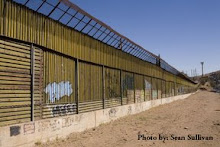 In April DHS Secretary Chertoff announced that he was using his waiver power to ignore 36 federal laws, including the Endangered Species Act, the Migratory Bird Treaty Act, the National Wildlife Refuge System Administration Act, and the National Environmental Policy Act, in order to speed up construction of over 300 miles of border wall. The only reason for Secretary Chertoff to waive these laws is that he knows that the border wall will violate them.
In April DHS Secretary Chertoff announced that he was using his waiver power to ignore 36 federal laws, including the Endangered Species Act, the Migratory Bird Treaty Act, the National Wildlife Refuge System Administration Act, and the National Environmental Policy Act, in order to speed up construction of over 300 miles of border wall. The only reason for Secretary Chertoff to waive these laws is that he knows that the border wall will violate them.The fate of the Lower Rio Grande Valley National Wildlife Refuge system is of particular concern. Consisting of individual tracts of native habitat linked by the Rio Grande, it creates a wildlife corridor, providing endangered species such as the ocelot and jaguarundi sufficient territory to find food, water, and mates. Migratory birds also rely on it to rest and refuel on their annual journeys, as well as for nesting. Maps released by DHS show the border wall slicing through many refuge tracts, and cutting off others from the river. The wall will fragment habitat, block migratory pathways, deny animals access to fresh water, and isolate breeding populations of endangered ocelot and jagurandi.
"It's taken 30 years, $80 million, and back-breaking effort to create an 80,000 acre wildlife corridor along the last 250 miles of the Rio Grande. To put a fence or wall through that is insanity," said Keith Hackland, President of the Friends of the Wildlife Corridor.
 “Currently, there are only 80 to 100 wild ocelots remaining in the continental U.S., and they cannot hope to survive without the wildlife corridor and the protection of the Endangered Species Act,” said Shane Wilson, President of the Friends of Laguna Atascosa. “The border wall, as proposed, will ensure that future generations will never witness the spectacular beauty of seeing an ocelot in the wild.”
“Currently, there are only 80 to 100 wild ocelots remaining in the continental U.S., and they cannot hope to survive without the wildlife corridor and the protection of the Endangered Species Act,” said Shane Wilson, President of the Friends of Laguna Atascosa. “The border wall, as proposed, will ensure that future generations will never witness the spectacular beauty of seeing an ocelot in the wild.”“Further habitat losses in the Valley, which serves as a vital stop over and feeding grounds for hundreds of species of migrating coastal shorebirds, inland waterfowl, and passerines, and nesting habitat for approximately 150 more species, will be catastrophic,” said Wayne Bartholomew, Executive Director of Frontera Audubon.
In their suit, the organizations ask the court to declare section 102 of the Real ID Act unconstitutional and to prevent the Department of Homeland Security from building walls, roads, or other infrastructure on the border that do not fully comply with all of our nation’s environmental laws.
"To instantly dissolve 96 years of environmental laws and protection with a mere wave of the hand is nothing short of monstrous,” said Jim Chapman, Board President of the Frontera Audubon Society. “If laws can be so easily swept aside on the border, the same precedent could be applied anywhere, from the Arctic National Wildlife Refuge to Yellowstone National Park. If our nation’s laws are optional, they aren’t really laws.”
In the April waiver the Department of Homeland Security suspended the following federal laws along the United States' southern border:
The National Environmental Policy Act
The Endangered Species Act
The Federal Water Pollution Control Act (commonly referred to as the Clean Water Act)
The National Historic Preservation Act
The Migratory Bird Treaty Act
The Clean Air Act
The Archeological Resources Protection Act
The Safe Drinking Water Act
The Noise Control Act
The Solid Waste Disposal Act, as amended by the Resource Conservation and Recovery Act
The Comprehensive Environmental Response, Compensation, and Liability Act
The Archaeological and Historic Preservation Act
The Antiquities Act
The Historic Sites, Buildings, and Antiquities Act
The Wild and Scenic Rivers Act
The Farmland Protection Policy Act
The Coastal Zone Management Act
The Wilderness Act
The Federal Land Policy and Management Act
The National Wildlife Refuge System Administration Act
The Fish and Wildlife Act of 1956
The Fish and Wildlife Coordination Act
The Administrative Procedure Act
The Otay Mountain Wilderness Act of 1999
Sections 102(29) and 103 of Title I of the California Desert Protection Act
The National Park Service Organic Act
The National Park Service General Authorities Act
Sections 401(7), 403, and 404 of the National Parks and Recreation Act of 1978
Sections 301(a)-(f) of the Arizona Desert Wilderness Act
The Rivers and Harbors Act of 1899
The Eagle Protection Act
The Native American Graves Protection and Repatriation Act
The American Indian Religious Freedom Act
The Religious Freedom Restoration Act
The National Forest Management Act of 1976
The Multiple Use and Sustained Yield Act of 1960



2 comments:
Poor little kitty. BANG!
Now build the wall!
Apparently in addition to psychological issues you have too much time on your hands. You really have nothing better to do than post a comment to every single entry on the blog, without enough time between postings to read the articles that you are pretending to comment on? This is the mentality that Limbaugh, Dobbs, and their ilk bank on. If they can rile you up they can raise their own ratings. They know that facts only get in the way. Facts like the wall only slowing crossers down by 5 minutes, so when ocelots are driven to extinction there is no corresponding benefit to balance out the loss.
Post a Comment